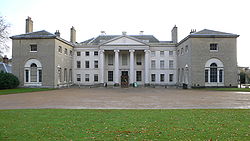Kenwood House
| Kenwood House | |
|---|---|

Front (north) facade, 2005
|
|
| General information | |
| Type | Stately home |
| Architectural style | Georgian and Neoclassical |
| Location | Hampstead Heath, London |
| Design and construction | |
| Architect | Robert Adam |
| Coordinates | 51°33′57″N 0°10′03″W / 51.5657°N 0.1676°WCoordinates: 51°33′57″N 0°10′03″W / 51.5657°N 0.1676°W |
| Built | c. 1616 |
|
Listed Building – Grade I
|
|
| Official name: Kenwood House (Iveagh Bequest) | |
| Designated | 10 June 1954 |
| Reference no. | 1379242 |
|
Listed Building – Grade II*
|
|
| Official name: Service wing and outbuildings to Kenwood House | |
| Reference no. | 1379244 |
|
Listed Building – Grade II*
|
|
| Official name: Sham bridge to south of Kenwood House | |
| Reference no. | 1379245 |
| Designated | 1 October 1987 |
| Reference no. | 1000142 |
Kenwood House (also known as the Iveagh Bequest) is a former stately home, in Hampstead, London, on the northern boundary of Hampstead Heath. It served as a seat for the aristocratic Murray and Guinness families and had various tenants before it was left to the nation under the care of English Heritage.
The original house dates from the early 17th century when it was known as Caen Wood House. The orangery was added in about 1700. In 1754 it was bought by William Murray, 1st Earl of Mansfield. He commissioned Robert Adam to remodel it from 1764–1779. Adam added the library (one of his most famous interiors) to balance the orangery, and added the Ionic portico at the entrance. In 1793-6 George Saunders added two wings on the north side, and the offices and kitchen buildings and brewery (now the restaurant) to the side.
The 2nd Earl and Countess of Mansfield added a dairy to supply Kenwood House with milk and cheese. After two years of negotiations, the 6th Earl of Mansfield leased the house to the exiled Grand Duke Michael Mikhailovich of Russia and his wife Countess Sophie of Merenberg in 1910.
Lord Iveagh, a rich Anglo-Irish businessman and philanthropist (of the Guinness family), bought the house from the Mansfield family in 1925 and left it to the nation upon his death in 1927; it was opened to the public in 1928. The furnishings had already been sold by then, but some furniture has since been bought back. The paintings are from Iveagh's collection. Part of the grounds were bought by the Kenwood Preservation Council in 1922, after there had been threats that it would be sold for building. In the late 1990s the house received approximately 150,000 visitors a year and an estimated 1 million people visited the grounds each year.
...
Wikipedia

